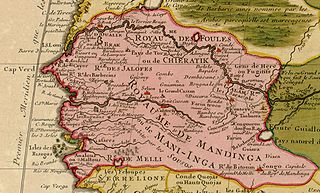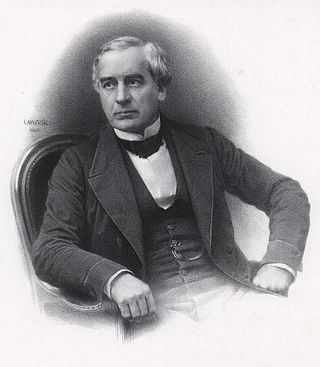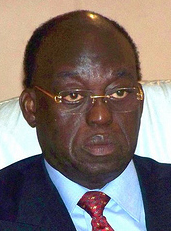 |
|---|
Elections to the French National Assembly were held in Senegal between 30 October and 2 November 1848.
 |
|---|
Elections to the French National Assembly were held in Senegal between 30 October and 2 November 1848.
The single Senegalese seat in the National Assembly was created by decree on 5 March 1848. [1] Following an order of 5 November 1830 and a law of 24 April 1833, all free-born people and freed slaves in the Four Communes in Senegal had full civic and political rights, the only French African colony to give such rights until the end of World War II. [1] The right to vote was given to all men over the age of 25 and who could prove they had lived in their municipality for the previous five years. [1] In total 4,726 men registered to vote. [2]
The election was contested by four candidates; former Governor Léandre Bertin du Château, the creole Barthélémy Durand Valantin, Victor Schœlcher, a well-known anti-slavery activist and De Giradin. [3] Although Schœlcher was on the ballot, he was not in Senegal at the time. [1]
| Candidate | Votes | % |
|---|---|---|
| Barthélémy Durand Valantin | 1,080 | 52.15 |
| Léandre Bertin du Château | 697 | 33.66 |
| Victor Schœlcher | 261 | 12.60 |
| De Giradin | 33 | 1.59 |
| Total | 2,071 | 100.00 |
| Total votes | 2,071 | – |
| Registered voters/turnout | 4,726 | 43.82 |
| Source: Bulletin de L'Institut Fondamental D'Afrique Noire [3] | ||

The history of Senegal is commonly divided into a number of periods, encompassing the prehistoric era, the precolonial period, colonialism, and the contemporary era.

Suffrage, political franchise, or simply franchise is the right to vote in public, political elections and referendums. In some languages, and occasionally in English, the right to vote is called active suffrage, as distinct from passive suffrage, which is the right to stand for election. The combination of active and passive suffrage is sometimes called full suffrage.

French West Africa was a federation of eight French colonial territories in West Africa: Mauritania, Senegal, French Sudan, French Guinea, Ivory Coast, Upper Volta, Dahomey and Niger. The federation existed from 1895 until 1958. Its capital was Saint-Louis in Senegal until 1902, and then Dakar until the federation's collapse in 1960.

The French Second Republic, officially the French Republic, was the second republican government of France. It existed from 1848 until its dissolution in 1852.

Abdoulaye Wade is a French then Senegalese politician who was President of Senegal from 2000 to 2012. He is also the Secretary-General of the Senegalese Democratic Party (PDS), having led the party since it was founded in 1974. A long-time opposition leader, he ran for President four times, beginning in 1978, before he was elected in 2000. He won re-election in 2007 with a majority in the first round, but in 2012 he was defeated in a controversial bid for a third term.

Macky Sall is a Senegalese politician who has served as the President of Senegal since April 2012. He was re-elected President in the first round voting in February 2019. Under President Abdoulaye Wade, Sall was Prime Minister of Senegal from July 2004 to June 2007 and President of the National Assembly from June 2007 to November 2008. He was the Mayor of Fatick from 2002 to 2008 and held that post again from 2009 to 2012. Sall was a long-time member of the Senegalese Democratic Party (PDS). After coming into conflict with Wade, he was removed from his post as President of the National Assembly in November 2008; he consequently founded his own party named the Alliance for the Republic (APR) and joined the opposition. Placing second in the first round of the 2012 presidential election, he won the backing of other opposition candidates and prevailed over Wade in the second round of voting, held on 25 March 2012. He is the first president born after Senegalese independence from France.

Jules Barthélemy-Saint-Hilaire was a French philosopher, journalist, statesman, and possible illegitimate son of Napoleon I of France.

Victor Schœlcher was a French abolitionist, writer, politician and journalist, best known for his leading role in the abolition of slavery in France in 1848, during the Second Republic.

Moustapha Niasse is a Senegalese politician and diplomat who has been President of the National Assembly from 2012 until 2022. He served in the government of Senegal as Foreign Minister of Senegal from 1978 to 1984 and again from 1993 to 1998. He was Prime Minister of Senegal for a few weeks in 1983, and he held that position again from 2000 to 2001.

Assimilation was a major ideological component of French colonialism during the 19th and 20th centuries. The French government promoted the concept of cultural assimilation to colonial subjects in the French colonial empire, claiming that by adopting French culture they would ostensibly be granted the full rights enjoyed by French citizens and be legally considered "French". Colonial settlements established by the French, such as the Four Communes in French West Africa, were created with the assimilation concept in mind, and while Africans living in such settlements were theoretically granted the full rights of French citizens, discriminatory policies from various French colonial administrations denied most of these rights to "full-blooded Africans".
The Four Communes of Senegal were the four oldest colonial towns in French West Africa. In 1848 the Second Republic extended the rights of full French citizenship to the inhabitants of Saint-Louis, Dakar, Gorée, and Rufisque. While those who were born in these towns could technically enjoy all the rights of native French citizens, substantial legal and social barriers prevented the full exercise of these rights, especially by those seen by authorities as "full-blooded" Africans. Most of the African population of these towns were termed originaires: those Africans born into the commune, but who retained recourse to African and/or Islamic law. Those few Africans from the four communes who were able to pursue higher education and were willing to renounce their legal protections could "rise" to become termed Évolués (Evolved) and were nominally granted full French citizenship. Despite this legal framework, Évolués still faced substantial discrimination in Africa and the Metropole alike.

The period from the mid-nineteenth to mid-twentieth centuries is the colonial period in Mauritania.
Black suffrage refers to black people's right to vote and has long been an issue in countries established under conditions of black minorities.

The Falloux Laws promoted Catholic schools in France in the 1850s, 1860s and 1870s. They were voted in during the French Second Republic and promulgated on 15 March 1850 and in 1851, following the presidential election of Louis-Napoléon Bonaparte as president in December 1848 and the May 1849 legislative elections that gave a majority to the conservative Parti de l'Ordre. Named for the Minister of Education Alfred de Falloux, they mainly aimed at promoting Catholic teaching. The Falloux Law of 15 March 1850 also extended the requirements of the Guizot Law of 1833, which had mandated a boys' school in each commune of more than 500 inhabitants, to require a girls' school in those communes. The 1851 law created a mixed system, in which some primary education establishments were public and controlled by the state and others were under the supervision of Catholic congregations.

Saint Barthélemy, officially the Collectivité territoriale de Saint-Barthélemy, also known as St. Barts (English) or St. Barth (French), is an overseas collectivity of France in the Caribbean. The island lies about 30 kilometres (19 mi) southeast of the island of Saint Martin; it is northeast of the Dutch islands of Saba and Sint Eustatius, as well as north of the independent country of Saint Kitts and Nevis.

Overseas France consists of 13 French-administered territories outside Europe, mostly the remains of the French colonial empire that remained a part of the French state under various statuses after decolonization. Some, but not all, are part of the European Union. "Overseas France" is a collective name; while used in everyday life in France, it is not an administrative designation in its own right. Instead, the five overseas regions have exactly the same administrative status as the metropolitan regions; the five overseas collectivities are semi-autonomous; and New Caledonia is an autonomous territory. Overseas France includes island territories in the Atlantic, Pacific and Indian Oceans, French Guiana on the South American continent, and several peri-Antarctic islands as well as a claim in Antarctica. Excluding the district of Adélie Land, where French sovereignty is effective de jure by French law, but where the French exclusive claim on this part of Antarctica is frozen by the Antarctic Treaty, overseas France covers a land area of 120,396 km2 (46,485 sq mi) and accounts for 18.0% of the French Republic's land territory. Its exclusive economic zone (EEZ) of 9,825,538 km2 (3,793,661 sq mi) accounts for 96.7% of the EEZ of the French Republic.

Elections to the French National Assembly were held in Senegal on 12 August 1849 as part of the wider French elections. Incumbent MP Barthélémy Durand Valantin was re-elected with 65% of the vote.

Parliamentary elections were held in Senegal on 30 July 2017, having originally been planned for 2 July.

Parliamentary elections were held in Senegal on 31 July 2022.